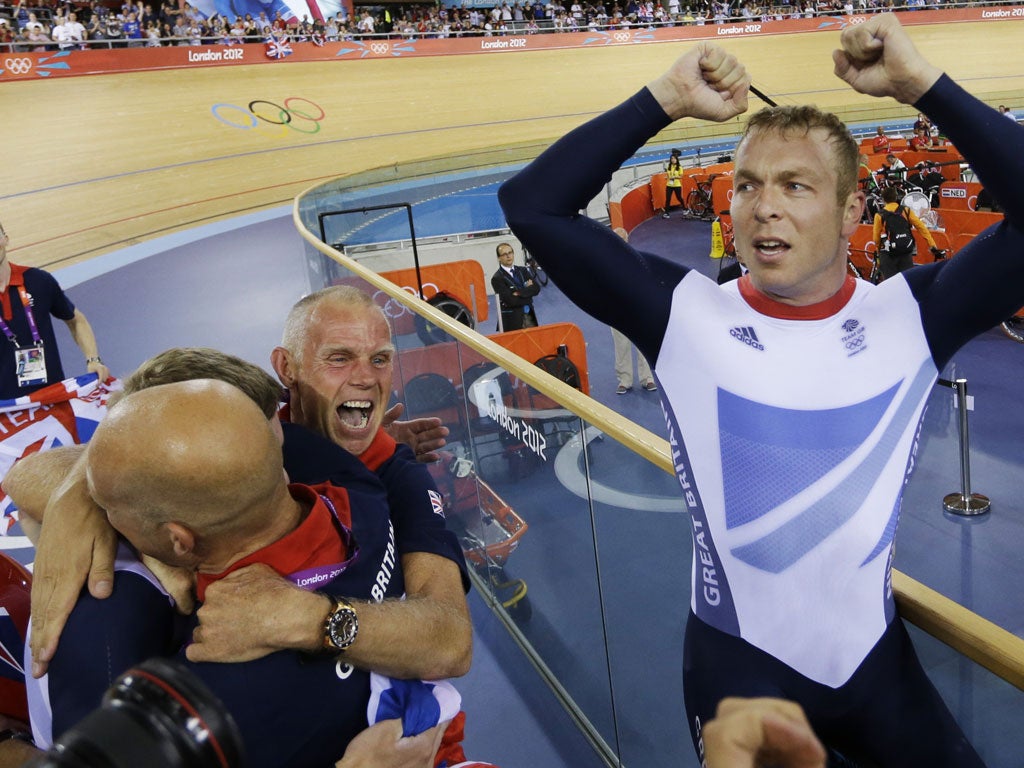James Lawton: In a velodrome theatre where dreams die in seconds Sir Chris Hoy finds perfection for Team GB
Hoy's marauders were in unbreakable form. They seemed increasingly on fire

We talk lightly about a rush of gold but what happened here last night, astonishingly and unforgettably, was something of a weightier order.
It was a one-man avalanche of the stuff. It was triggered by someone in pursuit of his fifth winning Olympic medal and, with some spectacular help from his young friends Jason Kenny and Philip Hindes, he took it as though it was nothing less than his right.
Sir Chris Hoy, at 36, had every reason to believe in that entitlement because when you put his night together in this tense arena which seemed to became a little steamier with each thrust of Hoy's ambition you had nothing less than a statement of competitive perfection.
This may be a big statement at the Games which have heard already so many claims about who is quite the great Olympian, but consider for a moment the nerveless progress of the understated man from Edinburgh to the top of the podium yet again. He nailed home the opening performance in the qualifying round when young Hindes – a bold replacement for Beijing hero Jim Staffe – slipped from his bike and was perhaps fortunate to win a restart. That could have left Hoy's attempt to add three more golds to the one from Athens and the three from Beijing in immediate ruins.
But Hindes held his nerve in the rerun, Kenny, a cyclist from Bolton who last night appeared to have borrowed the heart of Nat Lofthouse, the late Lion of Vienna, produced a withering leg and then Hoy came home with crushing momentum.
The clock said it was an Olympic record. But the senses suggested it was the first hook in a barrage to be launched at the fancied French team of Grégory Baugé, Kevin Sireau and Michael D'Almeida.
Hoy certainly unmasked that intention in his next outing, when Hindes, completely restored now after the horror of the aborted first ride, produced his great contribution of the night – a surge of power that left the final pummelling pace of Hoy another shattering blow to the morale of all opposition. It was another world record, another declaration that whoever stood in Hoy's way this night would have to go the very limits of both their speed and their nerve. Then the French appeared, a little tentatively, it has to be said.
They were right to be apprehensive. Hoy's marauders were now in unbreakable form. They seemed to be increasingly on fire. The French might have hope for a pause in the British momentum, they might have hoped for a little quarter. Instead they received the full weight of the Hoy claymore – another mighty blow. Hoy's men reeled off another world record, at 42.6 nearly half a second faster than the French.
For Hoy it meant that he had regained the lead over Bradley Wiggins in the accumulation of gold medals and drawn level with Sir Steven Redgrave. You could say when he returned to the podium he could scarcely have cared less. He had seized, superbly, another great moment and he would have this, too, for ever.
It was the most dramatic climax to a night on which Victoria Pendleton's despair had already told you all you needed to know about the savagely fine margins of her electric, hair-trigger sport. Diver Tom Daley was talking the other day about how quickly all your work can disappear with one fractional miscalculation. The elapsed time between ambition and failure, he said, was less than two seconds but here last night that seemed like a fairly luxurious time capsule when the world of the heroine of Beijing and her young partner, Jessica Varnish, fell apart.
They were heading quite brilliantly for a shoot-out for gold with the formidable Chinese pairing of Gong Jinjie and Guo Shuang when half the length Pendleton's front wheel went beyond that of her partner Varnish. The cruelty of it was that the 21-year-old from Bromsgrove had just produced a ride entirely in keeping with the quality of a night in which world and Olympic records were ripped apart. Some of an audience which included the Prime Minister, David Cameron, must have believed that by some miracle of democracy they had got their hands on the best ticket in town.
Pendleton was exhilarated by an opening ride to a world record, then made reflective by a countering burst of two from the Chinese before they apparently sauntered to the gold medal. Before the Chinese were also "relegated" for the same infraction, Pendleton fought unsuccessfully to stem the tears. She said, "I'm desperately disappointed for Jess because she has done a tremendous job getting this far. Her sprint today was the best of her life. I've no doubt she will be back in Rio and absolutely smash it.
"I'm sorry for disappointing all the people that came to support us and perhaps not offering the race that we could have done. I'm really sorry."
She could take it that the apology was accepted on a night when the watching world, surely, had a deeper sense of how close the great riders brush against glory and disaster.
Meanwhile, four British riders – Edward Clancy, Geraint Thomas, Steven Burke and Peter Kennaugh – broke their own world record in the qualifying round of the Team pursuit. They did it with an uncanny precision, a mellifluous, beautiful ride which said that here in this theatre of the most knife-edged battling there was also a place for the bike as an instrument of not inconsiderable art.
At least, that is, up to the moment of the reappearance of a certain, thunderous Sir Christopher Hoy.
Join our commenting forum
Join thought-provoking conversations, follow other Independent readers and see their replies
Comments